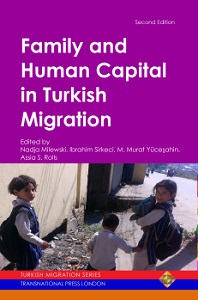Turkish-language ability of children of immigrants in Germany
Turkish-language ability of children of immigrants in Germany
Author(s): Oliver Klein, Nicole Biedinger, Birgit Becker
Subject(s): Geography, Regional studies, Sociolinguistics, Cultural Anthropology / Ethnology, Migration Studies, Turkic languages
Published by: Transnational Press London
Keywords: Germany; Turkey; immigrants; Turkish language; children; labor requirements;
Summary/Abstract: In the 1960s, German industry was in need of low-skilled labour and started to recruit ‘guest workers’ (Crul and Vermeulen 2003: p. 970). Many of these labour migrants came from Turkey. In 2011, about 1.6 million individuals of Turkish origin lived in Germany, constituting that country’s largest migrant group (Statistisches Bundesamt, 2011). Several studies report that on average, the socioeconomic status of Turkish immigrants is lower than that of native Germans. Furthermore, they are the least well integrated migration group in Germany (Diehl & Schnell, 2006). Research in Germany mainly focuses on the German language ability, but knowledge of the heritage language can help to maintain the immigrants’ ties to their ethnic culture, which in turn can facilitate their psychological adjustment. The stronger roots in the ethnic culture may facilitate their social and cultural adjustment through the ethnic community and may also facilitate their adjustment to the host culture (cf. Park et al., 2012). In the following paper we seek to answer the question of how children of Turkish immigrants in Germany are able to learn their heritage language (language retention/maintenance).
Book: Family and Human Capital in Turkish Migration
- Page Range: 59-67
- Page Count: 9
- Publication Year: 2015
- Language: English
- Content File-PDF

